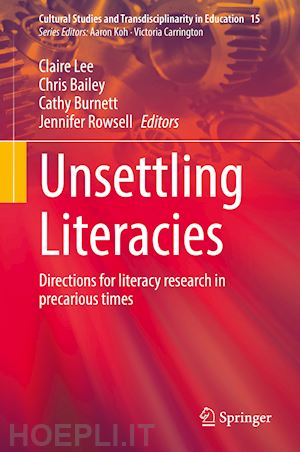
Questo prodotto usufruisce delle SPEDIZIONI GRATIS
selezionando l'opzione Corriere Veloce in fase di ordine.
Pagabile anche con Carta della cultura giovani e del merito, 18App Bonus Cultura e Carta del Docente
This book asks researchers what uncertainty means for literacy research, and for how literacy plays through uncertain lives. While the book is not focused only on COVID-19, it is significant that it was written in 2020-2021, when our authors’ and readers’ working and personal lives were thrown into disarray by stay-at-home orders. The book opens up new spaces for examining ways that literacy has come to matter in the world.
Drawing on the reflections of international literacy researchers and important new voices, this book presents re-imagined methods and theoretical imperatives. These difficult times have surfaced new communicative practices and opened out spaces for exploration and activism, prompting re-examination of relationships between research, literacy and social justice.
The book considers varied and consequential events to explore new ways to think and research literacy and to unsettle what we know and accept as fundamental to literacy research, opening ourselves up for change. It provides direction to the field of literacy studies as pressing global concerns are prompting literacy researchers to re-examine what and how they research in times of precarity.
Part 1. Shiftings.- 1. Trajectories of Being and Becoming: Relationships across Time that Keep us Humble (Catherine Compton-Lilly).- 2. Can a Research Space be a Third Space? Methodology and Hierarchies in Participatory Literacy Research (Sara Hawley & John Potter).- 3. Sharing the Screen: Reconfiguring Participatory Methodologies for Digitally Mediated Literacy Research (Bethany Monea).- 4. A Felt Presence: Affect, Emotion, and Memory as Literacy Researchers (Bronwyn T. Williams).- Part 2. Openings.- 5. Attending to our Response-Abilities: Diff/Reading Data through Pedagogies of the Other-Wise (Amélie Lemieux, Kelly C. Johnston, & Fiona Scott).- 6. Connected to the Soul: Autoethnography, Neurodiversity and Literacies in Times of Ongoing Change (Chris Bailey).- 7. Pop Up Productions: Gifts Presented in Loss (Jana Boschee Ellefson & Kim Lenters).- 8. Engaging Parents in Inquiry Curriculum Projects with Social Media: Using Metalogue to Probe the Methodological and Ethical Dilemmas in Literacy Research (Linda-Dianne Willis & Beryl Exley).- Part 3. Disruptings.- 9. Literacies Yet-to-Come: Young Children’s Emergent, Provisional and Speculative Literacies for Precarious Futures (Abigail Hackett).- 10. Perplexities and Possibilities in Literacy Curriculum & Pedagogical Change: A Research Partnership and Experiment in Materialist Methodologies (Michelle A. Honeyford, Shelley Warkentin, & Karla Costa).- 11. Engaging DIY Media Making to Explore Uncertain and Dystopic Conditions with 2SLGBTQ+ Youth and Allies in New Brunswick, Canada (Casey Burkholder, Funké Aladejebi & Jennifer Thompson).- 12. Uncertain Springs of Activism: Walking with Hoggart (Julian McDougall, Pete Bennett, & John Potter).
Claire Lee is an Early Career Research Fellow in the Children and Young People Network at Oxford Brookes University. Before completing her PhD in 2020, she was a primary school teacher and literacy subject leader. She is interested in children's learning lives and literacies, and how children develop a sense of self, as well as curriculum, power and classroom relationships. She conducts research that creates spaces for dialogue with children, using multimodal, participatory methods.
Chris Bailey is a Senior Lecturer in Education at Sheffield Hallam University. His work explores play; literacies; affective lived experience of space and place; sensory and embodied meaning-making; multimodal, participatory methods in research and communication. Chris is autistic and is interested in trying to work out what this means for how he understands and represents the world. He won the UK Literacy Association Student Research award in 2018 for the work that formed the basis of thisbook. He also received the UKLA / Wiley ‘Literacy’ Article of the Year Award in 2017.
Cathy Burnett is Professor of Literacy and Education at Sheffield Institute of Education, Sheffield Hallam University, UK. Her research has focused predominantly on the relationship between new technologies and literacies within and beyond educational contexts from a sociomaterial perspective, with a recent interest in the relationship between research methods and practice.
Jennifer Rowsell is Professor of Literacies and Social Innovation at University of Bristol’s School of Education in the United Kingdom.Her research interests include multimodal, makerspace and arts-based research with young people; digital literacies research with children; digital divide work in international contexts; and, applying posthumanist and affect theoretical and methodological approaches to literacy research.











Il sito utilizza cookie ed altri strumenti di tracciamento che raccolgono informazioni dal dispositivo dell’utente. Oltre ai cookie tecnici ed analitici aggregati, strettamente necessari per il funzionamento di questo sito web, previo consenso dell’utente possono essere installati cookie di profilazione e marketing e cookie dei social media. Cliccando su “Accetto tutti i cookie” saranno attivate tutte le categorie di cookie. Per accettare solo deterninate categorie di cookie, cliccare invece su “Impostazioni cookie”. Chiudendo il banner o continuando a navigare saranno installati solo cookie tecnici. Per maggiori dettagli, consultare la Cookie Policy.